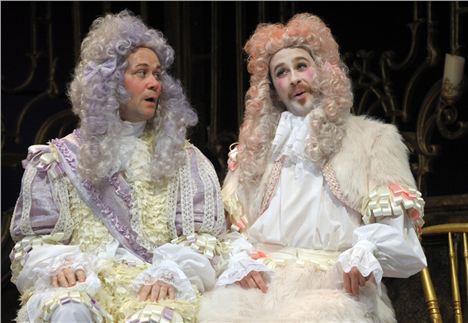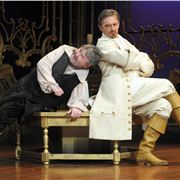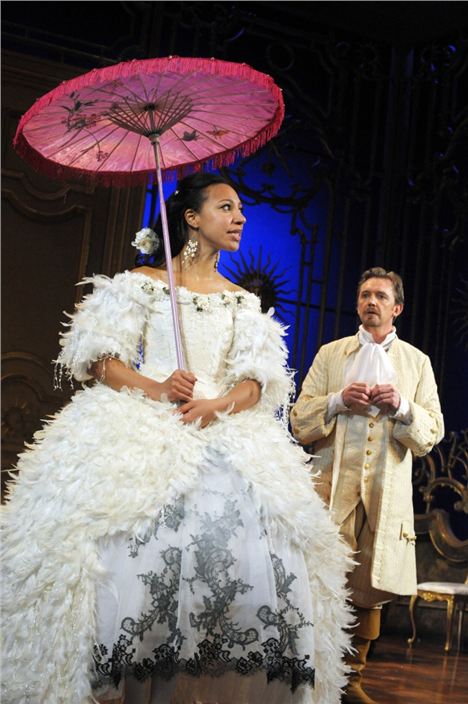GIVEN the previous success of McGough/Everyman Playhouse productions – Tartuffe, The Hypochondriac – it would seem that artistic director Gemma Bodinetz had hit on a winning formula.
Roger McGough's transformation from erstwhile weaver of words to master of French adaptation had created an insatiable appetite.
One can only admire the creative effort
which McGough must have put into the
adaptation to make it flow and inject his own idiosyncratic brand of witticisms
Now, with the benefit of the English Touring Theatre for a cast, and the skills of Jacquie Davies and Michael Taylor in costume and set design, what could go wrong? In all honesty, not much…and so it proved.
This production was always likely to win in Liverpool;. McGough has gilt-edged credentials with a home audience and, like the wedding feast at Cana, has created a Moliere trilogy where the best is saved until last.
Bodinetz’s experience of working with the ETT, ably-assisted in this production by Matthew Xia, served up a theatrical equivalent of an effervescent Eton mess, rich in comic couplets and exquisitely-timed bon mots.
We are invited into the bewigged and bepowdered peacockery world of the 17th century French salon – exclusive gatherings where conversation becomes an art form – during the reign of Louis XIV.
 George Potts and Leander Deeny
George Potts and Leander Deeny
Alceste (Colin Tierney) decides he has a personal mission to expose the vain flattery and obsequiousness of salon society, announcing that his path to personal salvation lies only in telling the truth.
Well, you know what I mean. Yes, the whole unvarnished truth ...no matter what effrontery this might cause or that it would result in his ostricisation.. He simply can't stand the fawning and petty jealousies within salon society and his lines are spoken without rhyme (wherever possible), singling him out from the rest.
His close friend and confidante, Philinte (Simon Coates), can't understand his reasoning and warns him to think of the social repercussions. In a way, Alceste's misanthropy is less hateful of all mankind, more detesting of its cloying mannerisms.
Ironically, Alceste is taken with a flirtatious young widow Célimène (Zara Tempest-Walters), who he ought to despise her for all her airs and graces. But he is drawn to her charms like a moth to a flame.
The entire play takes place within the confines of Célimène's salon, itself a confection of gilded screens and rococo finery that would have graced the palace of the Sun King himself.
Later, Alceste is invited to join hands in friendship with Oronte (Daniel Goode) and to offer a genuine critique of his poetry. Oronte's recital of "Hope" is a joy, delivered completely over-the-top and, in order to prove that honesty must prevail, Alceste damns him with barely-disguised faint praise.
Oronte is mortified and eventually issues a lawsuit. There are cameo performances by Clitandre (Leander Deeney) and Acaste (George Potts) which sizzle with rakishly camp waspishness and comic one-liners. There’s a quite memorable scene in the garden involving a topiary camel and animated court puppies which has to be seen to be believed.
Eventually, and I suppose inevitably, there's a showdown between Alceste and Célimène but, it is later disclosed that Célimène has set down scathing remarks about all her would-be lovers on paper, Alceste included.
Her own honesty, in the spirit of Alceste’s sought-after transparency, brings about her own downfall. In self-righteous indignation, Alceste declares that he renounces the world entirely and seeks a place where he, at least, will be the author of his own destiny.
Célimène is offered a final opportunity to redeem herself by joining him in this social wilderness, but rejects it out of hand. Finally, Alceste decides that he needs to make the decisive break he's threatened throughout the play and is seen leaving with his rustic manservant Dubois (Neil Caple) to start a new and unadulterated life.
All in all, The Misanthrope works because it improves on Moliere’s original and has a contemporary resonance in terms of the quest for absolute truth through the mores of respectability and veneer of social etiquette.
There are a couple of questions: I don’t know whether the original 1666 production included dance or musical elements, but the only one which seemed to fit was at the start as a masqued ball. Indeed, you could say that the mask was the motif for much of the play, especially in the way that the court circle tries to hide behind its social convenience and how Alceste does his best to replace them with authenticity.
The rest were superfluous, including a short scene which involved a “suitor waiting game” and an exchange of letters. Neither could I appreciate the scene involving a descent of letters and subsequent scrabbling around to furnish their contents.
 Neil Caple and Colin TierneyBut these are minor criticisms and one can only admire the creative effort which McGough must have put into the adaptation to make it flow and inject his own idiosyncratic brand of witticisms. That he’s done it not once, but three times now is a feat in itself.
Neil Caple and Colin TierneyBut these are minor criticisms and one can only admire the creative effort which McGough must have put into the adaptation to make it flow and inject his own idiosyncratic brand of witticisms. That he’s done it not once, but three times now is a feat in itself.
The whole play sparkles with ingenious rhymes, puns and comic observations. It’s McGoughs stock-in-trade but, here, they’re as abundant as confetti at a WAG's wedding and the audience loved them.
















